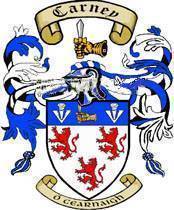
Carney & Wehofer Family
Genealogy Pages

PAGEN
-
Name PAGEN Birth Aft 1000 Normandy, France 
Christening 1066 Went Over To England From Normandy  [1]
[1] Gender Male _UID 5DAB594FF5D34C779B0D16380897D4A5496B Death Abt 1086 France  [1]
[1] Burial 1086 Had Lands In 16 Counties Listed In Domeday Book 
Person ID I3112 Carney Wehofer 2024 Genealogy Last Modified 5 Feb 2012
Children 1. Hugh De DE PAYEN, Sir, b. Bef 1086, France  d. Unknown, France
d. Unknown, France 
2. EDWARD, b. Bef 1086 d. Unknown Family ID F1487 Group Sheet | Family Chart Last Modified 29 Aug 2016
-
Notes - The Payne name is Norman in origin and is supposed to be a corruption of "Pagen", which was a term applied to the Tenth and Eleventh centuries, not only to individuals who were slow about embracing Christianity, but also to country people, in general, as being proverbially "slow". It was about this time in history that surnames came into use. The first that is known to have borne this name was "Pagen" of Domesday. He was a Norman who went over to England from Normandy in the time of Edward the Confessor, before the Norman Conquest. When William the Conquerer came, in 1066, Pagen's fortunes were greatly enhanced. Domeday Book, which was an enumeration of the estates of England, made in and about 1086, shows that Pagen held lands in sixteen counties, notes that he had the right to go "withersoever he would". He died at about this time, and left an eldest son, Edward who inherited his estates. ...
... The Paines and Paynes are the same Norman origin, but those who went to England with William the Conquerer did not Angelicize the name by changing the i to the y. The North Carolina branch of Paines are of the Ipswich, Massachusetts branch. The Roanoke, Virginia branch is also descended from this Ipswich branch. All other Virginians of this family are Paynes.
(source - http://members.aol.com/CissieP/stuff.html)
- The Payne name is Norman in origin and is supposed to be a corruption of "Pagen", which was a term applied to the Tenth and Eleventh centuries, not only to individuals who were slow about embracing Christianity, but also to country people, in general, as being proverbially "slow". It was about this time in history that surnames came into use. The first that is known to have borne this name was "Pagen" of Domesday. He was a Norman who went over to England from Normandy in the time of Edward the Confessor, before the Norman Conquest. When William the Conquerer came, in 1066, Pagen's fortunes were greatly enhanced. Domeday Book, which was an enumeration of the estates of England, made in and about 1086, shows that Pagen held lands in sixteen counties, notes that he had the right to go "withersoever he would". He died at about this time, and left an eldest son, Edward who inherited his estates. ...
-
Sources
